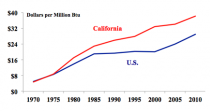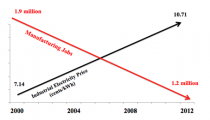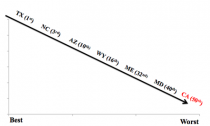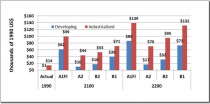E. Calvin Beisner, Ph.D., Cornwall Alliance for the Stewardship of Creation
One doesn’t know whether to laugh or cry.
Democratic Rep. Barbara Lee of (wouldn’t you know it?) California, six other congresswomen (D-CA/CA/USVI/NY/MN/IL), and five congressmen (D-MN/GA/AZ/CA/NY) have introduced House Congressional Resolution 36, calling America to fight “climate change,” aka global warming (of which there’s been none for over 16 years now), to prevent women from becoming prostitutes.

No, your eyes didn’t fool you. The resolution claims that poor women are “vulnerable to situations such as sex work, transactional sex, and early marriage that put them at risk for HIV, STIs, unplanned pregnancy, and poor reproductive health.” “Sex work” and “transactional sex” are euphemisms for prostitution.
Ignore in passing that it’s not “sex work” and “transactional sex” per se but the associated risks they bring that bother the resolution’s sponsors. I guess the prostitution would be okay with them if it just weren’t for those nasty side effects.
The irony of the resolution comes from a fact hidden in plain sight: According to the “the world’s most authoritative scientific effort to understand and address changes in the Earth’s climate,” the UN Intergovernmental Panel on Climate Change (IPCC), poverty will shrink more with global warming than without it, not just for the wealthy West but also for the developing Rest.
Why? Because IPCC’s warming scenarios are based on its economic forecasts. More economic growth, according to its models, causes more warming; less growth, less warming.
And we’re not talking about tiny changes at the margin - lifting people from abject poverty to slightly more tolerable poverty. We’re talking about lifting people from grinding, life-shortening poverty into a standard of living that meets or surpasses that of today’s industrialized countries.
Surprised? Not if you’ve been following IPCC Working Group III, which studies warming’s impacts, or the Stern Report, a British government effort to forecast economic impact of warming through this century. (Neither IPCC nor Stern, by the way, is known for understating the risks from global warming.)
Let’s put some hard numbers to the discussion.
IPCC offers various scenarios for warming, each based on a scenario for economic development. Under its coolest - “B1,” according to which the world keeps global warming down to 3.8F by 2100 after subtracting losses caused by the warming, developing nations’ gross domestic product (GDP) per capita rises from $900 in 1990 to $39,400 in 2100. Under its warmest scenario, “A1F1,” with high economic growth depending on lots of fossil fuel use and consequently lots of carbon dioxide emissions, the world warms by 7.2F by 2100 and developing nations’ GDP per capita rises, after subtracting for losses from warming, to $61,500, which is about one-fourth higher than America’s today.
Economist Indur Goklany, who has been studying the economic effects of both global warming and climate policy for over two decades, lays out all the likely scenarios in “Is Climate Change the Number One Threat to Humanity?” in the peer-reviewed journal Wiley Interdisciplinary Reviews: Climate Change. One figure, reproduced here, sums up the story.
“Net GDP per capita, 1990-2200, after accounting for the upper bound estimates of losses due to global warming for four major IPCC emission and climate scenarios. For 2100 and 2200, the scenarios are arranged from the warmest (A1FI) on the left to the coolest (B1) on the right. The average global temperature increase from 1990 to 2085 for the scenarios are as follows: 4 C for AIFI, 3.3 C for A2, 2.4 C for B2, and 2.1 C for B1. For context, in 2006, GDP per capita for industrialized countries was $19,300; the United States, $30,100; and developing countries, $1,500.” Source: Goklany, “Is Climate Change the Number One Threat to Humanity?” pre-publication draft.
So, if poverty drives women into prostitution, and if Congresswoman Lee and her colleagues don’t want that result, they should submit an entirely different resolution: “Protect the Poor, Prevent Prostitution: Don’t Fight Global Warming!”
E. Calvin Beisner, Ph.D., is founder and national spokesman of The Cornwall Alliance for the Stewardship of Creation.
“Excessive energy costs have helped obliterate the state’s manufacturing base” Wall Street Journal, 03/ 29/ 2013
Coal based energy is a key factor in global socio-economic development, transforming agrarian societies to modern industrial ones. This societal transformation, driven by the accumulation of income and wealth, eliminates many contagious diseases, reduces child mortality, and lengthens adult life expectancy. Throughout the world, rapid emergence from poverty has proceeded as countries develop electricity networks based on coal. These systems are capable of achieving massive economies of scale that provide large amounts of power at low cost, stimulating technological change, spurring productivity growth and raising living standards. It is no coincidence that coal provides over 40% of the world’s electricity. Consumers prefer low-cost and reliable power. Proponents of so-called “carbon-free” energy (e.g. wind) argue that their low market shares are the result of market distortions, such as the absence of a market price for environmental externalities. The fundamental reason for these low market shares, however, is that such intermittent sources are considerably more expensive than coal. To promote inherently uncompetitive technologies, some governments have resorted to subsidies and production mandates. These policies not only increase government spending but also impose hidden efficiency costs on the economy that silently erode our standard of living. Consumers end up paying more for energy and getting less. Spending that once went for education and housing is diverted to energy expenditures. Manufacturers also pay more for energy and they pass these higher costs on to consumers who end up paying even more for goods and services. Consumers are then forced to cut back again. The result is a compounding of efficiency losses throughout the entire economy.
California is the poster child of how an extreme anti-coal agenda is adverse to human health and welfare. California has disdained the nation’s most affordable and reliable source of electric power in favor of unreliable and expensive non-dispatchable sources such as wind and solar. Not surprisingly, California’s baseload electricity supply is now at risk and costs are dramatically on the rise. The urban legend that California’s energy policies are somehow superior to those of other states is being unmasked as the social and economic predicament of the state’s families and businesses becomes ever more apparent.
The Rhetoric
The Reality of California
“Energy policies in the state of California are very advanced compared to the rest of the nation,” California Council on Science and Technology, 2012
THE FACTS
Electric rates 40% above the national average
12 million people eligible for LIHEAP
700,000 manufacturing jobs lost since 2000
Budget deficit of $25 billion in 2011
Negative net worth of $127 billion in 2013
More children in poverty than Nebraska has people

Electricity Prices: California vs. the U.S. (Enlarged)
“...(an) important factor that is pushing manufacturing jobs out of California is the rising cost of electricity, caused by the states ill-conceived energy policies… What is already unreasonable will only become more so with the new mandates” POWER Magazine

(Enlarged)
Based on a set of speculative computer models and despite rising electricity prices, one of the nation’s highest unemployment levels and severe questions about grid reliability, California has nevertheless has proceeded with AB 32, the so-called “Global Warming Solutions Act”. This cap and trade program seeks to reduce greenhouse gas emissions to 1990 levels by the end of this decade. that is in just seven years. While the impact of this excessive legislation has yet to be determined, the California Manufacturing and Technology Association has estimated that AB 32 will cost consumers $135 billion by 2020 almost two-and-a-half times the annual funds spent on K12 education. AB 32 will lower the states 2020 GSP by $153 billion a loss of 5.6%. California will have 262,000 fewer jobs in 2020 because of AB 32 and energy expenses for the average family will increase $2,500 per year. AB 32 will reduce state and local tax revenues by over $7.4 billion annually an amount exceeding 10 years of funding for the Children’s Medical Services Program. The energy facts of life are catching up to the “Golden State”.

California’s Electricity Rates in Perspective (Enlarged)
“CPUC has approved nearly every renewable contract filed by the utilities, even when they rate poorly on least-cost, best-fit criteria.” California Division of Ratepayer Advocates
“The “Rate Impact Bomb” is lingering on the horizon”
CPUC Commissioner Michel Florio

California’s Electricity Rates and Manufacturing Jobs (Enlarged)
“Manufacturing jobs provide benefits to workers with higher overall compensation than other sectors, and to the economy through innovation that boosts our nation’s standard of living,” U.S. Department of Commerce, 2012
In a departure from historical reality, California’s political agenda views energy as a social problem. Policymakers are implementing an energy plan that is adverse to human health and welfare. Reliance on untested, unverified and idealized computer models is steadily destroying the future of the state raising rates, driving industry away, increasing unemployment, putting more people into poverty and placing both energy security and reliability at risk. After the deregulation debacle in the mid-90s they should know better. That earlier academic exercise cost consumers hundreds of billions of dollars, destroyed jobs and ousted Gov. Gray Davis through voter recall. In a critique of the state’s latest experimental foray into energy, California’s Independent Oversight Agency the “Little Hoover Commission” concluded the state has not done a legitimate cost-benefit analysis and warned of a “rate impact bomb” by 2016. That’s when consumers will have to start fully paying for the massive array of costly renewable projects the CPUC so cavalierly approved the last few years. And this time, reifying the results of esoteric computerized scenarios is taking an even greater human toll. The impacts of the drastically escalating rates associated with these ill conceived anti-coal policies are real, not hypothetical abstractions. Over 1.7 million Californians are unemployed. And the problem is not going away California is regarded as the worst state in the Union for business a reputation that may haunt for decades:
Best and Worst States for Business 2012
“California’s climate change regulations will discourage energy intensive industries from locating in the state, and existing industry will have an incentive to relocate outside of the state” Boston Consulting Group, 6/21/2012
Californians will pay a heavy price for ignoring our most abundant and affordable energy resource. Clean coal technologies work and are continually evolving. In many other states, and in other parts of the world, emissions have steadily declined, while electricity from coal generation has significantly increased. Rhetoric and political posturing do not produce one kWh of electricity. Clean coal does and California should recognize this fact before it’s too late.
“...millions of Californians could soon experience power outages. As the state derives more of its electricity from renewables, it needs more “peak” gas-fired plants that can ramp up to meet demand when the sun isn’t shining and wind isn’t blowing”. The Wall Street Journal, 03/29/2013
The Competitive Enterprise Institute announces a Congressional Staff and Media Briefing on EPA’s FOIA Scandals: “Richard Windsor,” Gina McCarthy, and the Abuse of Power with Chris Horner, Author of The Liberal War on Transparency and Senior Fellow, CEI, Monday, May 20th, 3 to 4 PM EDT Senate Dirksen Office Building
EPA’s FOIA Scandals:"Richard Windsor,” Gina McCarthy, and the Abuse of Power
The Obama Administration and in particular the Environmental Protection Agency have stonewalled a number of Freedom of Information Act requests by the Competitive Enterprise Institute that seek to make public more details in the form of public records of the Administration’s global warming agenda, war on coal, carbon tax plans, and other anti-affordable energy policies. In the past two years, CEI has filed a number of lawsuits to force the Obama Administration to comply with the law. Chris Horner will discuss what these FOIAs have discovered so far, including:
1. The use for official business by Administrator Lisa Jackson of an alias e-mail account under the name of “Richard Windsor”
2. The use for official business of private e-mail accounts by high EPA officials, prompting resignations
3. Ongoing attempts to conceal information by heavily redacting documents for impermissible reasons under FOIA, seeking to delay and deny access to information
4. Revelation of uncomfortably close relationships with officers of environmental pressure groups, and admitted efforts to conceal this
5. FOIA fee waiver requests are regularly denied to groups deemed unfriendly to this agenda, particularly CEI (which denials are overturned on appeal with equal regularity), but routinely granted to environmental pressure groups
6. The involvement of Gina McCarthy, Assistant Administrator for Air and Radiation for the past four years and nominated to be EPA Administrator, in the Richard Windsor scandal and other attempts to evade federal openness and transparency laws and policies.
Chris Horner
Christopher C. Horner, J.D., is a counsel and senior fellow at the Competitive Enterprise Institute. He is also director of litigation at the American Tradition Institute. Mr. Horner is the author of four books, most recently The Liberal War on Transparency, published in 2012 by Threshold Editions, a division of Simon and Shuster. He has filed many Freedom of Information Act requests to a number of federal agencies during the Bill Clinton, George W. Bush, and Barack Obama administrations.
-----------
by Anthony Watts
From the WSJ (h/t to Chris Horner)
The Washington Examiner reported Tuesday that the EPA under Ms. Jackson has a history of favoring groups that share the agency’s political agenda. “Conservative groups seeking information from the Environmental Protection Agency have been routinely hindered by fees normally waived for media and watchdog groups, while fees for more than 90 percent of requests from green groups were waived,” according to the report.
Government agencies like the EPA typically waive so-called Freedom of Information Act (FOIA) request fees for groups disseminating information for public benefit, but it’s up to the agency to decide whether a fee-waiver is justified. At the EPA, fees were waived for liberal environmental groups like Greenpeace and EarthJustice almost always. Meanwhile, the Competitive Enterprise Institute, a free-market think tank, “had its requests denied 93 percent of the time. One request was denied because CEI failed to express its intent to disseminate the information to the general public. The rest were denied because the agency said CEI ‘failed to demonstrate that the release of the information requested significantly increases the public understanding of government operations or activities.’”
This is important because the White House and Democrats have increasingly used regulators at the EPA to advance a green agenda that they can’t get through Congress.
Full story here
Meanwhile Pierre Gosselin writes that in Germany, something similar is going on:
If we ever needed help, it’s now…
We have a powerful Ministry now directing its full might and resources against people only because they have a different opinion. Chilling to say the least.



